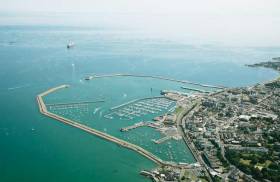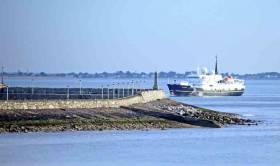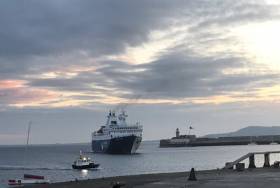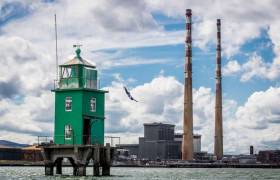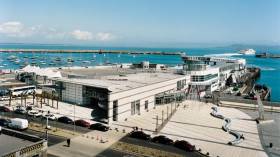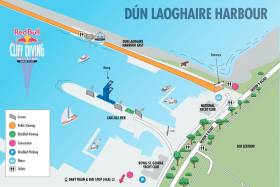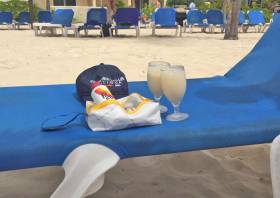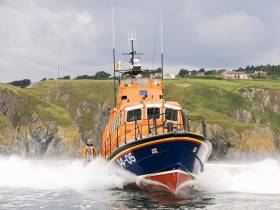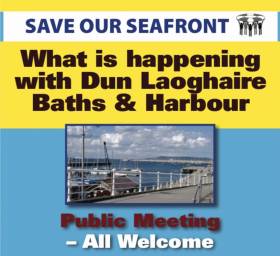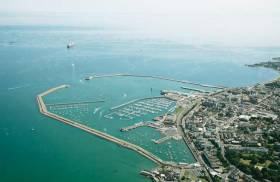Displaying items by tag: Dun Laoghaire
Dun Laoghaire-Rathdown County Council’s decision to withdraw plans for a €30 million berth for cruise liners in Dun Laoghaire “represents a victory for those who want to resist any significant future commercial role for the harbour and for the town”, according to one reader of The Irish Times.
In his letter to the newspaper published last Thursday (30 May), Dónal Denham of Dalkey says the move is “without doubt, a death-knell for this community which is already in serious difficulty”.
And he describes opposition to the proposals — including by the waterfront yacht clubs — as a “Luddite approach”.
Denham cites as a case study Helsinki, which he says takes in a combined €60 million in cruise liner revenue from its two adjacent ports, as an indication that investment in Dun Laoghaire would be quickly recouped — and provide a boon to the locality.
DLRCoCo confirmed to Afloat last month that its cruise berth planning application was withdrawn on 14 May, based on a report which “advised of the significant commercial, technical and environmental risk associated with this project”.
Local residents recently made calls to the council to open up Dun Laoghaire Harbour to more medium-sized cruise ships, in the wake of Dublin Port reducing its number of cruise berthings going forward.
Dun Laoghaire Cruise Ship Berth Project Abandoned
Tourism interests have said Dún Laoghaire will still be a cruise ship destination, in spite of Dun Laoghaire-Rathdown County Council’s decision to withdraw controversial plans for a 30 million euro cruise berth in the south Dublin harbour writes Lorna Siggins
An Bord Pleanála has confirmed that the application for an eight-year permit to construct a cruise berth facility in Dun Laoghaire was withdrawn last week.
Independent senator Victor Boyhan has welcomed the move by the local authority but has said that “questions need to be answered” on the entire cost of the plan.
"The application for an eight-year permit to construct a cruise berth facility in Dun Laoghaire was withdrawn last week"
An Bord Pleanála had granted permission in November 2016 for the controversial cruise ship berth but had restricted the size of vessel which it could facilitate to 250 metres.
The original planning application by Dun Laoghaire Harbour Company aimed to accommodate cruise ships of up to 340 metres long, at a berth extending 435 metres.
The ruling was challenged by the Save our Seafront campaign group in a High Court judicial review, and the application was referred back to the planning appeals board.
In July 2017, An Bord Pleanála relisted the application to allow” issues raised at the judicial review” to be considered, according to a spokesman.
This elicited a strong reaction from the Combined Yacht Clubs grouping in Dun Laoghaire, which described as “shattering” the re-opening of the application.
The harbour has since been taken over by the local authority, and several months ago councillors were informed that it had no funds for a proposed €5 million urban beach, a €51 million diaspora centre and a €30 million cruise berth facility.
A progress report to councillors indicated that about €1 million had been spent on the cruise berth plan, of which €250,000 was provided by the council.
Senator Boyhan said the Dun Laoghaire Rathdown county council decision to withdraw the planning application “makes absolute sense”, given that the appeals board had received over 150 objections to the project.
“It was a crazy idea that should never have got so far, yet initially council planners were very supportive of the idea,” Mr Boyhan said.
“If it went ahead, it would have destroyed the heritage harbour and its environs,” he said, adding that “people must be held to account” for large costs incurred.
Excursions Ireland, which handles cruise ship visits to Irish ports, said Dun Laoghaire would still be a “great destination for cruise vessels”, although larger craft has to anchor off the harbour.
“We’d love it to be developed, particularly now that Dublin Port has announced it will have to restrict the number of cruise ships it can take from 2021 onwards due to capacity constraints,” Excursions Ireland managing director Niamh McCarthy said.
“However, some operators actually prefer Dun Laoghaire, and it is a great destination for the more independent guests,” she said.
A cruiseship with an international ice class rating of 1B and regarded as one of the strongest ships operating in Antarctica has made a maiden call to Dun Laoghaire Harbour today, writes Jehan Ashmore.
Operated by Albratros Expeditions which describes the 12,798 gross tonnage ship as having a high maneuverability capability, a shallow draft (5.8m) and strong engines allowing for extended voyages into isolated fjords, creating exciting adventures for any Antarctica traveler.
An integral part of any such polar-cruise are shore landings at penguin rookeries and to research stations and other Antarctic wonders which are made possible by the ship's fleet of 20 Zodiacs. Among the facilities are several lecture halls, a restaurant serving 4-star international cuisine, bars and observation platforms. In addition there's even a sauna and swimming pool.
Despite its main geographical trading area, Ocean Atlantic's arrival to Dun Laoghaire Harbour followed warmer climes with a previous call to Las Palmas on Gran Canaria, Canary Islands.
The inaugural call of the cruiseship and a new client to the Irish port is a welcome boost for Dun Laoghaire-Rathdown County Council which was transferred to the local authority from the harbour company last year. Afloat will have more to report on this first of two calls to the port this week.
The occasion follows the launch of the season to the east coast port on Dublin Bay where much larger cruiseship, Norwegian Pearl with a much deeper draft (8.5m) which went to anchorage offshore. This took place this day a fortnight ago.
Incidentally, today, the Norwegian Cruises cruiseship with 2,394 passengers and 1,087 crew called to neighbouring Dublin Port and will remain overnight in the capital while berthed alongside Ocean Pier. As for Ocean Atlantic, the capacity cruiseship which has almost 200 passengers and a crew of 105 arrived to Dun Laoghaire this morning requiring a pilot cutter from Dublin Port and is scheduled to depart in the late afternoon. The next port of call is Port Ellen, Islay on the Scottish west coast.
The small ship has a rather angular appearance and dating to the Soviet era when launched as Konstantin Chernenko. Over the past three decades the 140m cruiseship has served subsequent owners and names and was renovated as recently in 2016.
A notable feature to be found on the cruiseship's starboard side is a vehicle ramp though this is obsured from view in Dun Laoghaire while berthed at the Carlisle Pier. Afloat will also have more about this feature.
The Red Bull Cliff Diving World Series makes its long-awaited debut in Dublin this afternoon (Saturday 11) with events kicking off at Dun Laoghaire’s Carlisle Pier at 5pm.
As previously reported on Afloat.ie, entry is now free for the two-day competition but organisers have advised everyone attending to arrive early to ensure a spot to witness the action.
Big numbers will be expected at the waterfront to see reigning champions Gary Hunt and Rhiannan Iffland continue their domination of the rankings after last month’s opening round in the Philippines.
Tomorrow’s finals (Sunday 12 May) will be broadcast live on Red Bull’s website, YouTube and Facebook from 7pm.
This weekend is not the first time Ireland has hosted the Red Bull cliff divers, who’ve previously made a splash on Inis Mór in the Aran Islands.
#dublinbay - The Irish Times writes that Dún Laoghaire-Rathdown County Council has rejected a proposal from $5 billion US children’s entertainment giant Hasbro to bring “Hollywood production” to the Dublin suburb with a studio in the harbour's former Stena Line terminal.
The US company submitted a joint expression of interest for the vacant building, which has lain unused since 2015, along with Irish animation studio Boulder Media, which it purchased in 2016.
According to the tender document submitted by the pair, the project would see “a truly unique studio and academic facility with stand-out identity and world-wide appeal. Hollywood production would truly be happening in the centre of Dún Laoghaire – with regularity”.
The tender, which has been seen by The Irish Times, states that the studio would house 350-400 crew and management “from day 1, rising to 650”. It continues: “Local spend of our highly skilled, higher earning creative and media professionals would also be very considerable.”
Hasbro is planning to use Boulder Media for a number of theatrical released movies on a long-term repeating cycle, which would support a €5 million investment in bringing the existing building up to standard.
More on the story can be read here through this link.
Red Bull Cliff Divers To Wow Crowds In Dun Laoghaire Next Month
“Unforeseen circumstances” have prompted the move of Dublin’s leg of the 2019 Red Bull Cliff Diving World Series from Grand Canal Dock to Dun Laoghaire Harbour.
But Dublin city centre’ loss is Dun Laoghaire’s gain — even more so now that the event will have free entry over the weekend of Saturday 11 and Sunday 12 May.
Bigger event space at Carlisle Pier on Dun Laoghaire’s waterfront will mean even more fans will be able to attend what promises to be a fun weekend out for all the family.
Both Saturday and Sunday events will kick off at 5pm, however organisers advise everyone to arrive early. The Sunday event will feature the Irish finals and will be broadcasted live on Red Bull’s website, YouTube and Facebook from 7pm.
Those who already purchased tickets for the Grand Canal Square event have been contacted for refunds.
Dublin is hosting the second leg of this year’s cliff diving series, which makes its debut in the capital after three previous visits to Inis Mór in the Aran Island, the most recent two years ago.
Old Dinghy Sails Bag A New Life Thanks To Enterprising Amanda
A new business launched by a well-known sailor on the Water Wags scene uses upcycled sails to create quirky travel washbags.
Prisca Bags is the brainchild of Amanda Chambers, who repurposes old fabric from many different sources into a variety of bags for multiple uses.
One of the latest additions to her range using dinghy and spinnaker sail fabric, turned into “squashable, washable” travel bags.
Making the perfect gift for a spring getaway to a loved one — or yourself! — Prisca Bags are now available from the Dun Laoghaire Pharmacy on Upper George’s Street and other local retailers.
Viking Marine is among those congratulating Amanda, known for sailing the Water Wag Freddie as well as Spirit in the White Sails class, on her new ‘green’ venture.
The chandlery at The Pavilion in Dun Laoghaire is also putting out a shout for old dinghy and spinnaker sails as Amanda is working on upcycled props for the store.
Dun Laoghaire & Wicklow Lifeboats Launch To Paddle Boarder In Distress
#Lifeboats - Dun Laoghaire RNLI responded to a stand-up paddle boarder who got into difficulty between Bray Head and Greystones yesterday afternoon (Sunday 27 January).
The volunteer lifeboat crew were requested to launch their all-weather lifeboat at 12.03pm and were on the water at 12.20pm.
The Irish Coast Guard helicopter Rescue 116 and Wicklow RNLI’s all-weather lifeboat were also tasked to the incident south of Bray Head.
Weather conditions were not good, with strong gale-force winds.
Dun Laoghaire’s crew of seven spotted the casualty who was clinging to his board and appeared in trouble.
Thirty-nine minutes after launch, the crew had the casualty onboard their lifeboat and quickly assessed he was suffering from “serious hypothermia”.
The casualty was airlifted to hospital by the coastguard. Wicklow RNLI recovered the paddle board and stood by as the casualty was winched onto the helicopter.
Commenting after the callout, Dun Laoghaire RNLI second coxswain Eamon O’Leary said: “The paddle boarder had suffered serious hypothermia when we arrived on the scene.
“It was a close call but he did the right thing in calling the coastguard who were quick to send out 116 along with Wicklow RNLI. It was fantastic teamwork by all involved.”
Dun Laoghaire Seafront Campaigners To Hold Public Meeting On Future Of Baths & Harbour
Dun Laoghaire campaign group Save Our Seafront will hold a public meeting next Monday 28 January to discuss ongoing and future plans for Dun Laoghaire Harbour, including its baths restoration project.
The meeting is scheduled for 8pm next Monday night at the Royal Marine Hotel and speakers will include Richard Boyd Barrett TD, Councillor Melisa Halpin and Fergal McLoughlin of An Taisce.
For further information find ‘Save Our Seafront - Dun Laoghaire’ on Facebook or contact [email protected]. The new Save Our Seafront website is at SaveOurSeafront.com.
Could Brexit present an opportunity for Dun Laoghaire’s harbour?
In a letter to The Irish Times last Tuesday 8 January, local Fine Gael councillor John Kennedy spells out his reasons why the port could be positioned as an additional resource to help deal with the pressures of an expected increase in sea trade.
Cllr Kennedy suggests that funding could be sought for the South Dublin port via the European Commission’s trans-European transport network (TEN-T) strategy for the realigning of trade connections with mainland Europe.
“It makes sense for a combination of European and exchequer funding to be allocated to reactivate the potential of Dún Laoghaire port for international trade ahead of the critical post-Brexit juncture,” Cllr Kennedy writes.
Cllr Kennedy’s letter comes not long after talk of reviving ambitions for a National Watersport Centre in Dun Laoghaire, as previously reported on Afloat.ie.



























